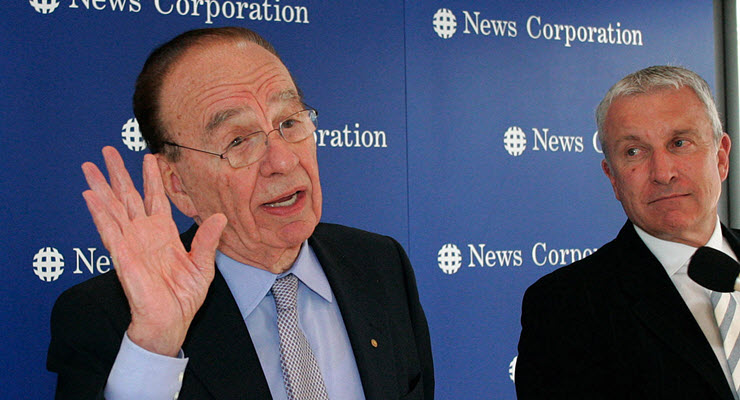
The Right To Know campaign made a huge splash across Australia’s mainstream papers this week, but this is hardly the group’s first outing.
It’s been more than a decade since the launch of the Right To Know coalition, and the group’s staggered history offers an uncomfortable peek into Australia’s descent into a police state as well as the politics at News Corp (the de facto leaders of the group).
Nominally, Australia’s Right To Know (ARTK) launched in 2007 as a joint initiative between News Limited (now News Corp Australia), Fairfax (now Nine), ABC, SBS, AAP, Sky News, Free TV Australia, and Commercial Radio Australia. The union, MEAA, would join shortly after.
But the initiative began as the brainchild of News’ former chairman and chief executive John Hartigan. It was run in conjunction with other media organisations by News’ then-director of corporate affairs Greg Baxter, head of editorial policy Campbell Reid and manager of corporate affairs Creina Chapman.
“The fact that News led this surprised a lot of people,” Hartigan tells Crikey. “But fundamentally, I always viewed News Corp as a company of journalists; that was the DNA in that business.”
Crikey has recently explored the hypocrisy of News Corp denouncing anti-terror laws that it — and other outlets — helped normalise. But Hartigan’s era at The Australian saw a much more pronounced divide between news and opinion.
As a long-time media figure tells us, editors in 2007 “would never have seen it as an anomaly that they got Hedley Thomas on the front page [breaking news about the flawed pursuit and detention of Dr Mohamed Haneef] and columns inside talking about how important it is to have national security legislation”.
ARTK launched with a list of (retrospectively quaint) complaints, and the announcement of a new independent press freedom audit (chaired by former ICAC boss Irene Moss).
Launching in 2007 also meant ARTK could campaign with the prospect of a likely change of government. Kevin Rudd would actually act on some of the group’s core demands with freedom of information reforms and a whistleblower inquiry.
ABC’s Mark Scott would later laud this “unholy alliance of media competitors” — and the small Rudd-era wins — at an ARTK conference in 2009.
The group copped its fair share of criticisms too. Fresh from losing seven Press Council members due to budget cuts in 2009, departing chairman of the Australian Press Council Professor Ken McKinnon hit out at the suggestion that the ARTK could take over media advocacy: “[it’s] obviously naïve” and “used as another justification for the swinging budget cut proposals”.
Hartigan also found himself in a war of words with Paul Keating in 2010. After a dispute between his daughter Katherine and a News Corp photographer, the former PM criticised News Corp’s history of breaching privacy and ARTK’s dismissal of privacy law reform.
After peaking at 18 submissions in 2009, ranging from everything from suppression orders to uniform defamation, ARTK entered an unofficial limbo.
Writing for Crikey in 2012, David Salter noted that the group’s last press release was in May 2010, and that the default organiser (Chapman) would only say that they had not “had a huge number of issues on the table for the past 12 to 18 months”.
Salter speculated that the lull had more to do with funding and internal inconsistencies, as well a change in leadership to Hartigan’s successor (and non-journalist) Kim Williams in 2011.
Hartigan, who departed News Corp in 2011 after 41 years of service, puts this hiatus down to a natural exhaustion of momentum. It likely isn’t a coincidence that the recent surge in submissions — from one in 2012 to more than 15 this year — correlates with the Abbott-Turnbull-Morrison governments’ much more aggressive crackdown on metadata, foreign interference and encryption.
Hartigan later moved to Prime, Baxter to Newgate Communications, and Chapman to ACMA (via the offices of Tony Abbott and Joe Hockey). Reid is now listed as the group’s primary contact. Behind the scenes, the group is unofficially coordinated by News Corp’s head of government affairs Georgia-Kate Schubert, who took on the role in 2012 and was a prominent critic of Turnbull’s “anti-treason” laws last year.
On top of an immediate public response to the AFP raids, recent issues taken up by ARTK include defamation and suppression, mandatory data retention and state and territory sexual violence reporting laws.
There are plenty of legitimate criticisms of the current campaign, from the media’s ongoing reliance on government leaks to a historic lack of solidarity to those not dubbed “journalists”. But there’s unarguably still a place for ARTK; Australia’s “draconian” whistleblowers legislation, among other things, has recently dragged us down to number 21 on the world press freedom index.
As Crikey wrote following the group’s 2009 peak: “There seems to be little doubt that the Right To Know coalition has contributed to a change of climate and some real legislative action on freedom-of-speech issues. Only time will tell whether its narrow focus and unashamed self-interest will be a long-term weakness.”
What would you like to see out of the Right To Know campaign? Send your comments to boss@crikey.com.au.









In the land of the blind, the one-eyed man is king.
Funny. I always viewed Limited News as a company of untrammelled, one-eyed political hacks journalists – paid to try and persuade enough of the electorate of the greater ‘fitness to govern’ of Murdoch’s pet Limited News Party, to elect them on behalf of the American Rupert – that was the DNA in that business?
Crusading for ‘their right’ to present whatever partisan, subjective politicised pap they desired – and bugger the rest of society.
Sorry, that “journalists” was a mistake.
There are no journalists working for NewsCrap they are churnalists, stenographers, typists, and after dark bed bugs.
The fact that those others of our “viewsmedia” are happy to be seen in cahouts with this “used toilet paper” (that attacks the ABC whenever the ABC have the temerity to air something Limited News would rather stay under wraps – because it’s an embarrassment for their Limited News Party) says more about their short-sightedness and how they actually see their ‘roll’ in society.
What I’d like to know (and I reckon it’s my right) is why can’t they call out Limited News for the partisan, political parasites they are and their effect on our society? They know what Murdoch’s Muppets are like and their effects in what they validate (“coal”, “climate change”, Adani”, “GBR health”, “M-DBA bastardisation” etc etc) for fearful votes : rather than challenge or set straight.
After this is all over they know it will be back to business-as-usual for Murdoch’s grenade-tosser media hostilities m.o.
That would be better than playing footsies with Rupert.
Maybe it’s time for an update of that 4 Corners episode about how Murdoch pays no tax here or mostly anywhere. Funny how how all these large multinationals are incorporated in the small mostly rural state of Delaware.
Some months ago I wrote a letter to the Murdoch Press re censorship and the actions of government
It didn’t get a run.
Over the next few weeks I noticed the change developing in the Murdoch Press , especially after one of their staff was raided.
Surprisingly after 6 weeks my letter was published.
So now they agree with me and publish. Why didn’t they do it earlier?
And of course we all know the answer to that.
How hypocritical of Hartigan!!! After being instrumental in laying waste the Olympic Park for supercars motor racing circuit, he was appointed chair of Destination NSW where he worked to bring the failing event to Newcastle – through a medium density residential area – and laying waste to our premier parkland and sending many of own businesses to the wall – all deals done secretly of-course!
Truthful reporting should never be punished under any circumstances.